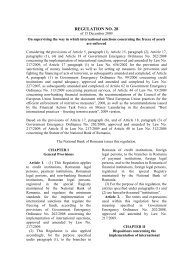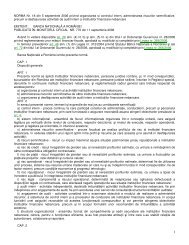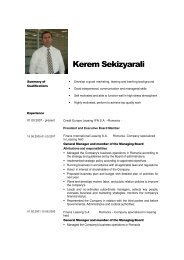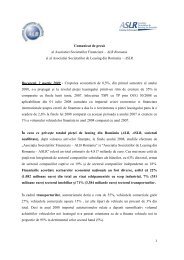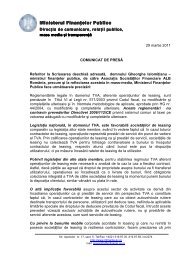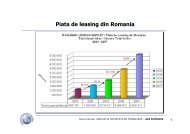Descarca catalogul - ALB
Descarca catalogul - ALB
Descarca catalogul - ALB
Create successful ePaper yourself
Turn your PDF publications into a flip-book with our unique Google optimized e-Paper software.
din urma s-a sesizat cu privire la cadrul legal<br />
incorect din Romania in privinta bunurilor<br />
nerecuperate de societatile de leasing in<br />
circumstantele descrise mai sus, motiv pentru<br />
care a avertizat in acest sens autoritatile fiscale<br />
din tara noastra. Avertizarea s-a concretizat prin<br />
declansarea împotriva României a primei etape<br />
a fazei precontencioase a acţiunii în constatarea<br />
neîndeplinirii obligaţiilor care îi revin în temeiul<br />
Directivei TVA.<br />
Acesta actiune din partea Comisiei Europene<br />
a provocat o prima reactie a autoritatilor din<br />
Romania, care, in luna august a acestui an,<br />
au abrogate, cu efect din 1 ianuarie 2013,<br />
prevederile din Codul fiscal ce impuneau<br />
autocolectarea TVA pentru bunurile constatate<br />
lipsa din gestiune. Aceasta abrogare va avea un<br />
impact direct si asupra societatilor de leasing,<br />
care, in teorie, n-ar mai trebui sa autocolecteze<br />
TVA pentru bunurile nereposedate.<br />
Totusi, potrivit noile reglementari TVA, care vor<br />
intra in vigoare la data de 1 ianuarie 2013, s-ar<br />
putea sa existe obligatia in sarcina societatilor<br />
de leasing de ajusta TVA dedusa initial pentru<br />
bunurile nerecuperate la care am facut referire<br />
in acest articol, obligatie care impune practic<br />
societatilor de leasing plata aceluiasi TVA la<br />
buget, doar ca acesta va fi calculat utilizand o<br />
alta formula.<br />
In acest context, este lesne de inteles<br />
nemultumirea din randul operatorilor de<br />
leasing din Romania, care asa cum spuneam<br />
la inceputul acestui articol, continua acum, cu<br />
eforturi sustinute, sa clarifice si sa solutioneze<br />
problema.<br />
Cu toate acestea, ramane sa vedem daca<br />
autoritatile competente din Romania vor<br />
folosi in mod intelept ocazia data de faptul ca<br />
normele de aplicare ale Codului fiscal urmeaza<br />
a fi actualizate in raport cu ultimele modificari<br />
din Codul fiscal, pentru a oferi un remediu<br />
companiilor de leasing pentru prejudicial creat.<br />
Commission, the latter took note of the<br />
incorrect Romanian VAT legal framework<br />
concerning goods which cannot be repossessed<br />
by leasing companies, in the above described<br />
circumstances, and, as a result, has given<br />
a notice to the fiscal authorities from our<br />
country. This notice was in fact the launch of<br />
the first phase of litigation against Romania, in<br />
the action of assessing its failure to fulfil the<br />
obligations under the VAT Directive.<br />
This action undertaken by the European<br />
Commission has provoked a first reaction in<br />
the Romanian authorities, which, in August<br />
this year (with effect from 1 January 2013),<br />
have abolished the Fiscal Code provisions<br />
that required companies to self-charge VAT<br />
on missing goods. This amendment will also<br />
have a direct impact on leasing companies<br />
who, in theory should no longer be required<br />
to self charge VAT for goods which cannot be<br />
repossessed.<br />
On the other hand, it seems that according to<br />
the new VAT rules, applicable as of 1st of<br />
January 2013, leasing companies may be<br />
required to adjust the VAT initially deducted<br />
for those goods that cannot be repossessed; this<br />
obligation basically requires leasing companies<br />
to pay the same VAT to the budget, but using a<br />
different formula.<br />
Within this context, it is easy to understand the<br />
discontent of Romanian leasing market, which,<br />
as we said at the beginning of this article, is<br />
actively trying to clarify and solve this issue.<br />
Nevertheless, it remains to be seen if the<br />
competent authorities will use the opportunity<br />
given by the fact that the Implementing rules<br />
to the Fiscal code also need to be updated and<br />
amended (in accordance with the changes to<br />
the Fiscal Code), in order to repair the damage<br />
done to leasing companies.<br />
64<br />
60184_file_interior_lucian_v9.indd 64<br />
11/5/2012 9:22:00 AM





